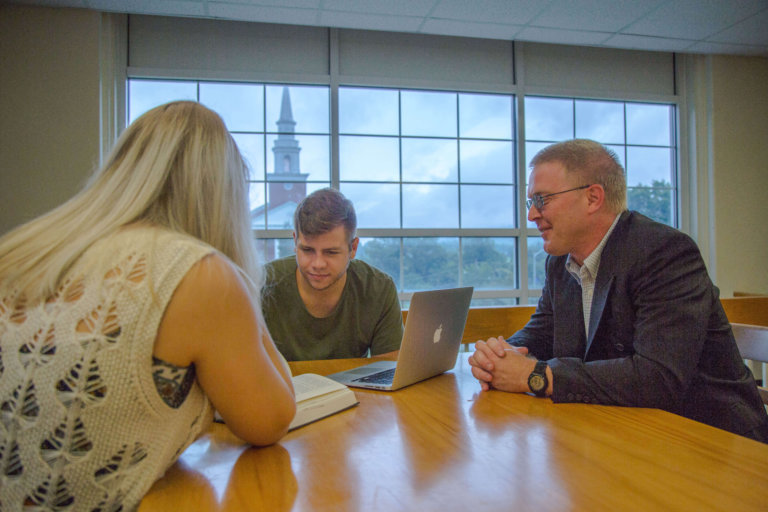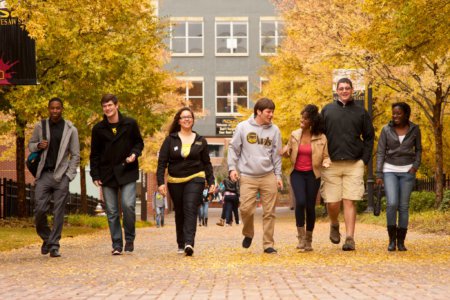
Nothing elevates the college experience more than a vibrant campus community. It’s not just about meeting other people and forging lifelong friendships and connections, although that’s definitely one appeal of joining college clubs and organisations.
The college community provides students with a myriad of direct and indirect benefits. Join the debate club and you’re set to harness collaboration and effective communication skills. Take part in the recycling programme and you get to dive deeper into local public policy. Volunteer and you’ll learn time management and apply classroom knowledge in real life. The result? A well-rounded college experience.
There are also advantages in store for their careers and professional development. When students participate in activities on and beyond campus, they gain transferable skills that give them an edge in the job market. Here are some colleges that put community first:
Bluefield College
Nestled in the beautiful Appalachian Mountains in southwestern Virginia is Bluefield College — a premier, inclusive and Christ-centred liberal arts college. It is the sister institution to the second largest medical school in the US, Edward Via College of Osteopathic Medicine (VCOM). Over 1,000 students — representing 32 states and 16 countries — call this place home.

Source: Bluefield College
“At Bluefield College, your experience is not just about college. It’s about a calling,” says Dr. David Olive, President of Bluefield College. “It’s about exploring and finding your passion at a place where you can know and be known.”
At Bluefield College, there is a full spectrum of programmes and services designed to help students do just that. From rigorous academics to meaningful explorations of faith through service, worship, and reflection, the College promotes a well-rounded, community-centred life. An array of ministry-focused programmes allow Bluefield students to serve others, including mission trips, Bible study groups, and service projects. The Centre for Counselling & Wellness offers psychological, emotional, and developmental support. Bluefield also organises a scholarship auction as part of the school’s annual homecoming festivities to raise funds — participants walk away with great prizes and proceeds go to a good cause, the BC Fund for Scholarships.
Programmes at its School of Nursing are just as community-driven. This is how future Florence Nightingales can gain professional nursing knowledge and experience with breadth, depth and the Bluefield edge: practicums that put the exacting academic work to test in underserved areas such as rural and economically disadvantaged communities. The Bachelor of Science in Nursing (BSN) programme achieves this in four years and takes place in state-of-the-art biology, chemistry, and practical nursing labs led by dedicated faculty. By the time you graduate from this Christ-centred nursing degree, you’ll be ready to take and pass the NCLEX-RN certification exam. To know more about this Southern Association of Colleges and Schools Commission on Colleges accredited institution, click here.
Centre College
Community-based learning has a rich tradition of theory, scholarship, and activism at Centre College.It is characterised by: sustained, extensive work outside the classroom; meaningful student reflection; significant integration of community perspective; and alignment between community and classroom learning — enhancing students’ learning of course content, understanding of the community, and sense of civic agency. Volunteerism is also an important component of Centre College. Over 80 percent of Centre students participate in community service — not just as a one-time activity, but a way of life.

Source: Shutterstock
Alumnus Jeri Howellsays,m “The faculty and staff at Centre supported my varied passions — music, the environment, foreign language, cultural exchange, and social justice — from day one. My Centre mentors helped me to unite these passions through interdisciplinary projects, internships, and now my Fulbright fellowship in Costa Rica.”
Danville — where Centre is based — has been named one of the best small towns in America. Students can find pizza pubs, smoothie bars, yoga and cycle studios, community arts centres, and cafés just a stone’s throw away from Centre College’s campus. Here, at the 29th Most Innovative School according to US News and World Report, over 50 majors, minors, pre-professional and dual-degree programmes are offered.
Wartburg College
For students who learn better with personal access to professors and small class sizes, Wartburg College is the place to be. The school has 1,564 students — 20% of which are international. All students study and live in a tight-knit, welcoming community. Together, they work hand-in-hand towards joining a diverse alumni of 22,000 who are currently excelling in 50 different states and 70 countries.

Source: Shutterstock
Community Builders is a project which brings together students who care about their local community and country — this includes Waverly-Shell Rock sixth graders, Wartburg College students, and members of the local community. It is supported by Wartburg College, Waverly-Shell Rock Community School District, St. Paul’s School, and Self-Help International. The Centre for Community Engagement (CCE) focuses on student learning and vocational development through internships, field experiences, and job shadowing. Annual events held by the Volunteer Action Center are American Red Cross Blood Drive, St. Elizabeth’s Week and Martin Luther King, Jr. Week.
“I think Wartburg did a good job of helping me explore different opportunities and engaging with other people that have kind of trained me into the person that I have become. The community that I have built here, I feel like I could leave and still come back and feel that sense of community,” says student Danielle Gerlach.
Bard College
A 10:1 student-to-faculty ratio, 1,900 undergraduates, 17% international students, 297 faculty members. Bard College has a campus community like none other.

Source: Shutterstock
Diversity, Equity, and Inclusion (DEI) is part of Bart’s DNA, addressing racism, sexism, classism, ableism, homophobia, transphobia, and religious discrimination. The Council for Inclusive Excellence (CIE) sponsors and co-sponsors campus-wide events such as speakers, panels, and movie screenings that highlight social justice, intercultural communication, equity, and inclusion. Volunteer activities and civic engagement workshops are regular occurrences on Bard’s campus. The Centre for Civil Engagement (CCE) facilitates sustainable relationships with partners to address real issues facing communities, promote dialogue and debate, and effect change.
It’s an environment that has a profound impact on students’ personal and academic growth. “In the course of answering simple and practical questions from family members, he elucidated a philosophy of encouragement, challenge, personal responsibility, and student confidence-boosting that lies at the heart of what I believe the transition to higher education should be about,” shares Marika Handakas, a proud parent of a Bard student.
Bard College offers individualised academic programmes in four divisions: Arts; Languages and Literature; Science, Mathematics, and Computing; and Social Studies. Students engage in both traditional and interdisciplinary academic endeavours, exploring interdivisional programmes and concentrations. Dual-degree programmes, study abroad programmes, and career-oriented internships provide an immersive experience, preparing Bard graduates for fulfilling careers.
*Some of the institutions featured in this article are commercial partners of Study International










